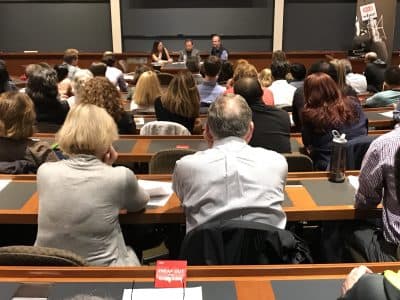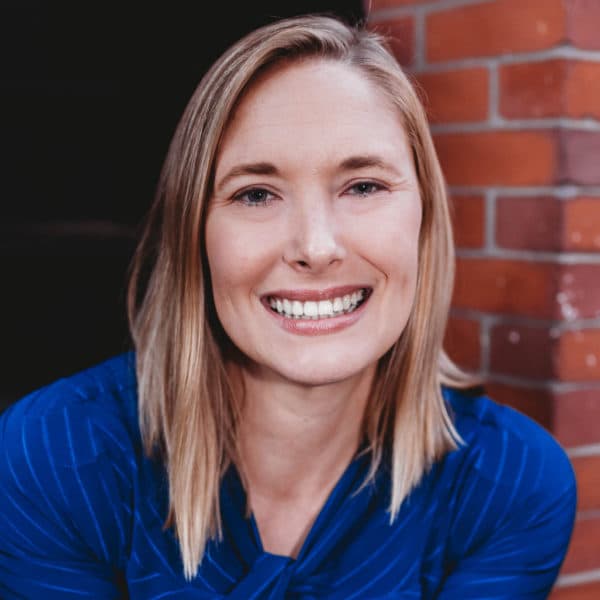Advertisement
Is Our Electoral Process Broken?
Resume
This week on Freak Out And Carry On, recorded live in front of an audience at Harvard Law School in Cambridge, Massachusetts, Ron Suskind and Heather Cox Richardson talk with Harvard Law Professor Lawrence Lessig. They discuss reforming the electoral college, the gerrymandering case in front of the Supreme Court, and how to get money out of politics. They look back on the four presidents who won the electoral college but lost the popular vote and detail the 2000 Supreme Court case Bush v. Gore.
Excerpts
Lawrence Lessig: We don't know what Donald Trump really thinks. We only know what he says. And early in the campaign he realized that he had an extraordinary opportunity to embarrass his Republican rivals by embracing the anti-corruption message and attacking the corrupting influence of money in politics. And that was extremely important. We will never solve this problem if it's perceived as a partisan issue. If we think that the Democrats want to fix it and the Republicans don't then it will never get fixed. The idea that the person who was becoming the leading Republican candidate in the Republican nomination for president was attacking super PACs and attacking everybody else on stage because he said they were all bought. It was an amazing moment of hope followed by endless reasons for tears. There was an extraordinary study released in the middle of 2016 by University of Maryland which found the frustration that Americans have with their government is higher than it has ever been in the history of polling of our government. And the most striking feature of this study was that there was no statistical difference between Republicans and Democrats on this point. This is the one common frustrated feeling Americans have that we should be able to leverage. I think that's partly what accounted for maybe one fifth of Trump's voters who were chanting the "drain the swamp" mantra. They thought maybe this guy--the guy that all the insiders hated--maybe this guy will have the power to actually blow up the system and change this corruption.
Heather Cox Richardson: Larry, your big thing lately has been the Electoral College. Of course the fact that Donald Trump won in the Electoral College and overwhelmingly lost the popular vote is still very much on a lot of people's minds. Can you walk us through what you are thinking about the Electoral College? Why is the Electoral College where you're putting all your energies right now?
Lawrence Lessig: After the 2016 election the electoral college became the most salient example of our electoral inequality. It is the place where it's easiest for people to see. We've built a system that says to Americans voters if you happen to be a Republican in Massachusetts, or a Republican in California, or a Democrat in Texas, you literally do not matter to the presidential campaigns. And we know this by the behavior of the presidential campaigns. Fourteen states accounted for ninety-nine percent of campaign spending in the last election cycle. Those 14 states accounted for 95 percent of where the candidates spent their time. The other 5 percent they were in California and New York raising money from rich people. So the point is the system has develop such that the simple promise of a democracy where we are equal has been denied.

Heather Cox Richardson: Four times since the Civil War we've had a president who is elected in the Electoral College and loses the popular vote. Rutherford B. Hayes in 1876. The one that interest me most is 1888 when Benjamin Harrison loses the popular vote by 100,000 votes--not a small amount--to Grover Cleveland. Actually Cleveland was already in the White House and has to move out of the White House and he's not a happy camper about that. And then of course it happens in Bush versus Gore in 2000 and Donald Trump versus Hillary Clinton in 2016. What happens in 1876, with Rutherford B. Hayes is that he takes over and tries to go middle of the road and has a somewhat successful presidency. But the other three decide that because they have won with a minority of the popular vote they've been anointed by God and they run with it and they pass laws that the vast majority of Americans hate. And what's interesting to me about that is when that happens they have to do a number of things to stay in power. They suppress the vote. They pack the courts. They gerrymander. And at one point actually, from 1889 to 1890, we get six new states to make sure the Republicans will never lose the Electoral College again. That's why we have South Dakota, North Dakota, Montana, Idaho, Wyoming and Washington State. There are there to pack the electoral college for the Republicans in 1889 to 1890. But the reason that interests me is because if you look at the present moment it looks very much like that. But what happened, especially after the debacle of 1888, is the American people stepped up and it gave us Teddy Roosevelt coming from within the Republican Party and saying this ain't my party and this is not my country. We got reform. We get this extraordinary backlash where people use the media to take the country back. And we got one of our most progressive eras in American history called--you'll be shocked to hear this--the progressive era. So I look at that and I think we're looking at something very similar.
Ron Suskind: Bush v. Gore ends up being a moment that sort of stunned everybody because you felt as though things were taken out of the hands of Washington and it was ending up in some counties in Florida, when there were debates over hanging chads. Remember the hanging chads? And it's interesting, covering politics during the 1990s, there was an imbalance in terms of tactical forcefulness between the two parties. I'll just be very frank about it. The Republicans are simply more tactically clear-eyed and forceful. And the fact is they've triumph because of it. What happened in Bush v. Gore is as soon as Florida was locked up, the Bush crowd sent down a crack team. They did a couple of things. First they acted as though they already were elected president. Very smart. But you'll also remember what we were covering at the time. My friends in the fourth estate were very focused on how odd it was that so many Jewish voters from Boca Raton were voting for Pat Buchanan. Remember that? So that was the story that carried the day. People missed the fact that significant numbers of African-Americans were disenfranchised in the state. Ninety percent of African-Americans were voting for Al Gore based on a distillation of the numbers. That meant 4,752 black Gore voters, almost nine times Bush's ultimate margin of victory of five hundred odd votes, were prevented from voting. And it is not a stretch to conclude that that purge cost Gore the election. Now you look at that and you look at the divided land we're living in, politically. It's often just a few votes that make the difference in Larry's "winner-take-all" system. It matters when you get a couple of counties without voting machines that are working. It matters when people go to the polls and say I need a birth certificate. I mean, how many people here have a birth certificate handy?I don't. Or a passport?
The views and opinions expressed in this podcast are solely those of the participants and do not in any way reflect the views of WBUR management or its employees.
